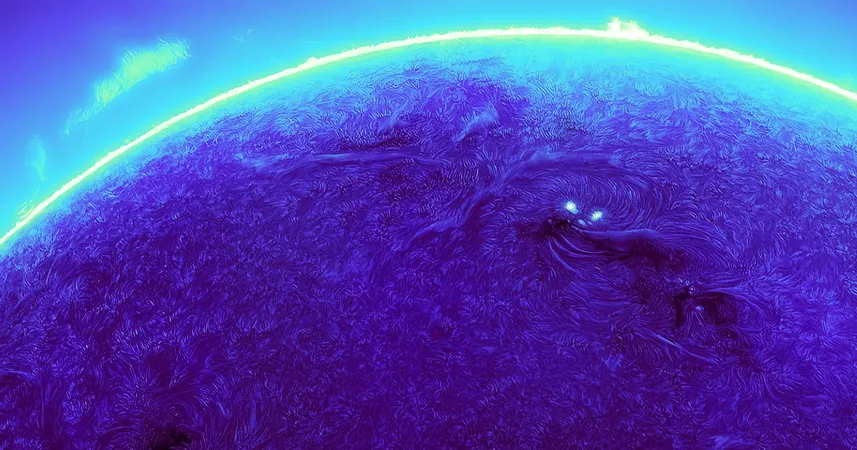
The Astonishing Discovery: Scientists Uncover the Volcano That Turned the Sun Blue!
2025-01-12
Author: Yu
The Astonishing Discovery: Scientists Uncover the Volcano That Turned the Sun Blue!
In a groundbreaking revelation, scientists have unraveled one of history's most enigmatic climatic events—why the Sun appeared to take on a sorrowful blue hue back in 1831. This peculiar phenomenon was not just a quirky color change; it reflected a series of catastrophic global effects that followed a volcanic eruption.
A Gloomy Year
In 1831, the world was gripped by a significant volcanic eruption that released an enormous amount of sulfur gas into the atmosphere. This environmental disaster led to a cooling effect that lowered global temperatures by nearly two degrees Fahrenheit, triggering widespread famine, chaos, and social unrest. The aftermath of the eruption created an atmospheric haze that not only dimmed the sunlight but controversially turned the Sun shades of blue, purple, and even green in numerous accounts from that year.
Identifying the Culprit
According to a detailed study published in the Proceedings of the National Academy of Sciences, researchers have identified the Zavaritskii volcano, located on the desolate Simushir Island of the Kuril Islands, as the source of this climatic upheaval. The breakthrough came through painstaking analysis of ash samples extracted from ice core samples, allowing scientists to match tiny ash particles found in the ice with those from the Zavaritskii volcano.
Lead researcher Will Hutchinson, a geoscientist from the University of St Andrews, shared how modern techniques enabled them to examine microscopic shards of ash measuring just one-tenth the diameter of a human hair. Hutchinson expressed the excitement of their findings, describing the moment of matching the volcanic ash to the ice core as a true 'eureka moment.'
The Kuril Islands: A Volcanic Hotspot
The Kuril Islands, currently under Russian control but disputed by Japan, are known for their volcanic activity—with dozens of volcanoes scattered across the archipelago, many of which are still not thoroughly studied. Hutchinson emphasized the importance of monitoring these volcanoes, noting how our lack of knowledge regarding their risks could lead to unforeseen disasters should a major eruption occur in the future.
A Cautionary Tale
Reflecting on this historical event, Hutchinson warned that if a similar eruption were to happen today, we might not be significantly better prepared than our ancestors were nearly two centuries ago. The lessons learned from the past serve as a stark reminder of the unpredictable nature of climate-changing eruptions and the necessity for enhanced volcanic monitoring systems.
This revelation not only shines a light on the potential hazards posed by unmonitored volcanoes but also highlights how volcanic activity can have far-reaching effects on our planet's climate and ecosystem. Scientists continue to explore these geological mysteries, emphasizing the importance of understanding our planet's history to predict future climatic challenges.
Stay tuned for more astonishing discoveries in geology that might just change our understanding of Earth’s history!

 Brasil (PT)
Brasil (PT)
 Canada (EN)
Canada (EN)
 Chile (ES)
Chile (ES)
 Česko (CS)
Česko (CS)
 대한민국 (KO)
대한민국 (KO)
 España (ES)
España (ES)
 France (FR)
France (FR)
 Hong Kong (EN)
Hong Kong (EN)
 Italia (IT)
Italia (IT)
 日本 (JA)
日本 (JA)
 Magyarország (HU)
Magyarország (HU)
 Norge (NO)
Norge (NO)
 Polska (PL)
Polska (PL)
 Schweiz (DE)
Schweiz (DE)
 Singapore (EN)
Singapore (EN)
 Sverige (SV)
Sverige (SV)
 Suomi (FI)
Suomi (FI)
 Türkiye (TR)
Türkiye (TR)
 الإمارات العربية المتحدة (AR)
الإمارات العربية المتحدة (AR)